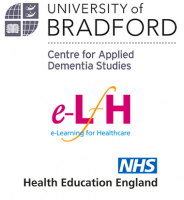Pharmacological Interventions in Dementia Care for Nurses



This session will investigate the most common medications prescribed for people living with dementia, including their risks and benefits and the importance of regular recorded reviews.
Learning Objectives
By the end of this session you will be able to:
- List the most common medications prescribed for people living with dementia
- Describe the main risks and benefits of using a range of anti-psychotics, antidepressants, anxiolytics, anticonvulsants and cognitive enhancers
- Recognise issues with regards to polypharmacy for people living with dementia
- Explain the importance of recording and reporting side-effects and/or adverse reactions to medication
- Describe how to administer and review medication safely and appropriately in consultation with people affected by dementia
This session will investigate the most common medications prescribed for people living with dementia, including their risks and benefits and the importance of regular recorded reviews.
This session has been mapped to the Dementia Training Standards Framework and is designed to support the Dementia Action Alliance Dementia Statements.
Before commencing this session you may wish to complete:
- Module 1 – Introduction to Living with Dementia/Dementia Awareness (407-0030)
Hadar is a Senior Lecture in Pharmacy at the University of Bradford and has worked at various NHS Mental Health service providers in his career. Hadar is currently the lead Pharmacist for Medicine Safety for one of the largest third sector organisations providing mental health services in the North West of England.
Hadar has a varied research background and has undertaken several systematic reviews which have been used to inform clinical guideline development nationally and internationally. Hadar, through his experience and practice, provides specialist professional and clinical advice to the Care Quality Commission and regularly participates in inspections. Hadar has worked on expert advisory groups for the Medicines and Healthcare products Regulatory Agency and is a member of The National Institute for Health and Care Excellence serving in the Centre for Guideline Development.

- Diabetes in Practice for Nurses
- Posted By Diabetes Qualified
- Posted Date: 2024-11-16
- Location:Online
- This comprehensive eLearning course is for Nurses looking to extend their diabetes knowledge.
- Introduction to the Healthy Child Programme course...
- Posted By eIntegrity Healthcare e-Learning
- Posted Date: 2024-11-16
- Location:Online
- This session traces the history of the development of the current healthy child programme (pregnancy...
- Safeguarding Adolescents for Nurses
- Posted By eIntegrity Healthcare e-Learning
- Posted Date: 2024-11-16
- Location:Online
- This session aims to help you understand specific issues relating to child protection for adolescent...
- Confidentiality for Nurses
- Posted By eIntegrity Healthcare e-Learning
- Posted Date: 2024-11-16
- Location:Online
- This session introduces the main principles and legal aspects of confidentiality as applied to the c...
- Capacity and Consent for Nurses
- Posted By eIntegrity Healthcare e-Learning
- Posted Date: 2024-11-16
- Location:Online
- This session explores the UK legal framework for assessing competence in young people, with particul...







